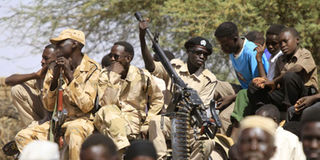94 dead in tribal fight in Sudan's Darfur

Sudanese soldiers keep watch as they sit next to civilians in the Shangli Tobaya area for displaced people in North Darfur state, on June 18, 2013. Fighting in the past two days between rival tribes in Sudan's Darfur region has killed 94 people, despite a peace deal between them, a tribal leader said Saturday. AFP PHOTO/ASHRAF SHAZLY
What you need to know:
- UN experts and human rights activists have also accused government security forces of involvement in Darfur's tribal fighting.
KHARTOUM
Fighting in the past two days between rival tribes in Sudan's Darfur region has killed 94 people, despite a peace deal between them, a tribal leader said Saturday.
"Since yesterday there has been a clash between us and the Salamat after they tried to attack us," Ahmed Khiri, who described himself as a leader of Misseriya troops, told AFP.
"We lost eight of our men and killed 86 from the other side."
But a Salamat leader gave a lower toll.
"The Misseriya attacked our village and we resisted, losing 52 of our men," he said, asking not to be named.
The troop leader said his group killed "a number" of their adversaries but could not be more specific.
He added that his forces destroyed two of the 30 vehicles armed with "heavy weapons" which Misseriya used in the attack.
The African Union-UN peacekeeping mission in Darfur (UNAMID) says inter-ethnic fighting has been the major source of violence in the far-west region this year, leading to the displacement of an estimated 300,000 people in the first five months alone.
That is more than in the previous two years combined.
The latest fighting occurred in southwestern Darfur's Umm Dukhun area, near the Chadian border.
"There is a committee trying to bury the bodies," said Khiri, who professed to be speaking from the battlefield.
Fighting between Misseriya and Salamat in April led 50,000 to flee into Chad, the United Nations said.
On July 3 the two tribes signed a peace agreement under which they were to pay compensation to each other, and refugees would return.
The Salamat in April had accused members of the paramilitary Central Reserve of joining fighting in Rahad el Berdi near Umm Dukhun, which the tribe said left dozens dead.
UN experts and human rights activists have also accused government security forces of involvement in Darfur's tribal fighting.
But Mohamed Ibn Chambas, the head of UNAMID, has said the nature of the tribal disputes -- mainly competition for land, water and mineral rights -- made it hard to tell who was on which side as police and militia also had ethnic affiliations.
Prior to this year's upsurge of violence there were already 1.4 million people in camps for people uprooted by Darfur's conflict, which began a decade ago when rebels from black tribes rose against what they said was the domination of Sudan's power and wealth by Arab elites.
Security problems have more recently been compounded by the inter-tribal fighting, kidnappings, carjackings and other crimes, many suspected to be the work of government-linked militia and paramilitary groups.
In its latest Humanitarian Bulletin, the UN's Office for the Coordination of Humanitarian Affairs (OCHA) said that about 12,000 people are believed to have fled into Umm Dukhun town from the surrounding area after the Misseriya-Salamat unrest began in April.
OCHA said logistical and security challenges have delayed delivery of emergency shelter and other aid to the displaced.
"Most commercial transporters in the area are not willing to go to Umm Dukhun citing insecurity on the roads," OCHA said in the July 15-21 bulletin.




